The United Porphyrias Association is proud to work closely with the porphyria experts on the UPA's Scientific Advisory Board and at the Porphyrias Consortium.
We're pleased to introduce our Experts in Action where we'll feature:
Sign up to never miss a feature!
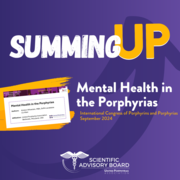
This study involved focus groups with porphyria patients to explore the emotional and psychological challenges they face. Participants discussed their lived experiences, shared coping strategies, and offered recommendations for additional support to improve their quality of life.

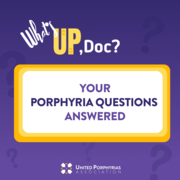
Question: I think I might have Acute Intermittent Porphyria (AIP). My doctor ordered a urine porphyrin test, my porphyrins were high but then I was told that the results aren't considered diagnostic. Why not? And what tests should my doctor order?
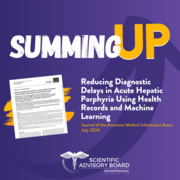
People with symptomatic acute hepatic porphyria (AHP- includes AIP, VP and HCP) often wait about 15 years to get diagnosed, which is too long. This research used information from electronic health records (EHR) and machine learning (ML) to see if they could find people with AHP faster.

"Everything you learn about the disease you learn from patients. It’s important to understand how the disease really affects people, how the treatments benefit people, and for that you really need to listen to your patients."

Question: How will menopause affect my porphyria? Are estrogen treatments for menopause safe?

"A porphyria diagnosis creates a space between you and the life you were living before... it can feel isolating and lonely."
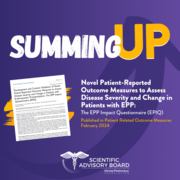
Having a standardized questionnaire tool is important for evaluating the effectiveness and impact of new treatments for EPP. Regulators like the FDA will consider improvements in quality of life, along with other factors, when deciding whether to approve new treatments. This research developed a questionnaire to evaluate the impact of EPP on health-related quality of life (HRQL) called the EPP Impact Questionnaire or EPIQ.

"I realized that my condition with the sun was either going to define my life or become a cool addition to the story of my life."
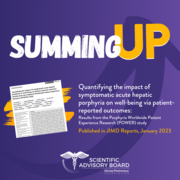
Up to this point, most research that has been published about AHP has focused on symptoms and care during an acute attack. This research looks at the full burden of acute hepatic porphyrias (AHP, includes AIP, HCP and VP) on patients from around the world.